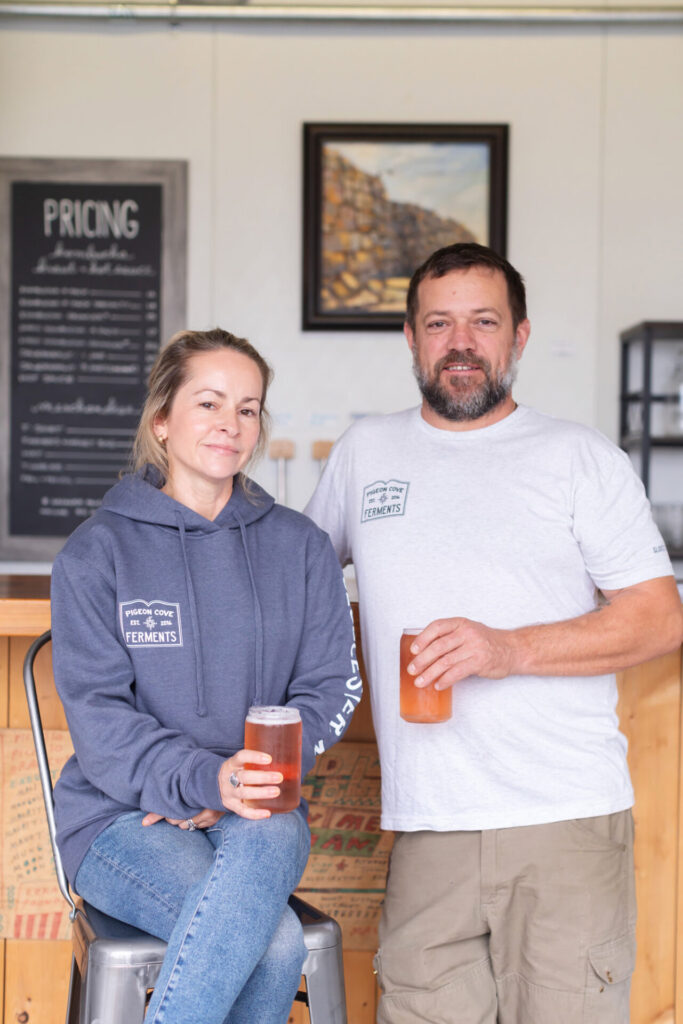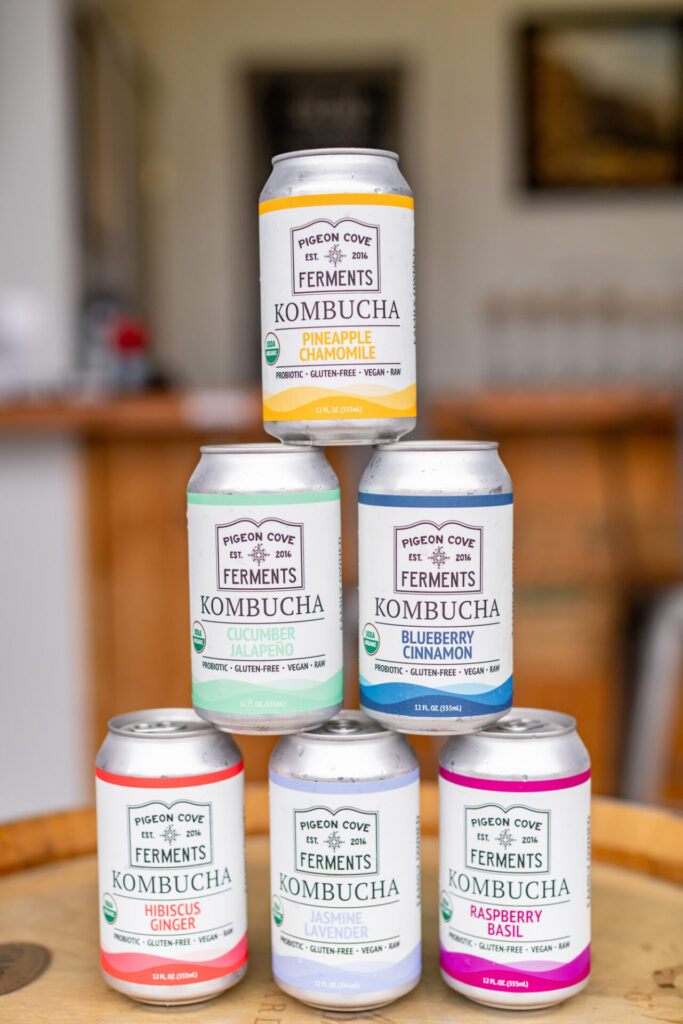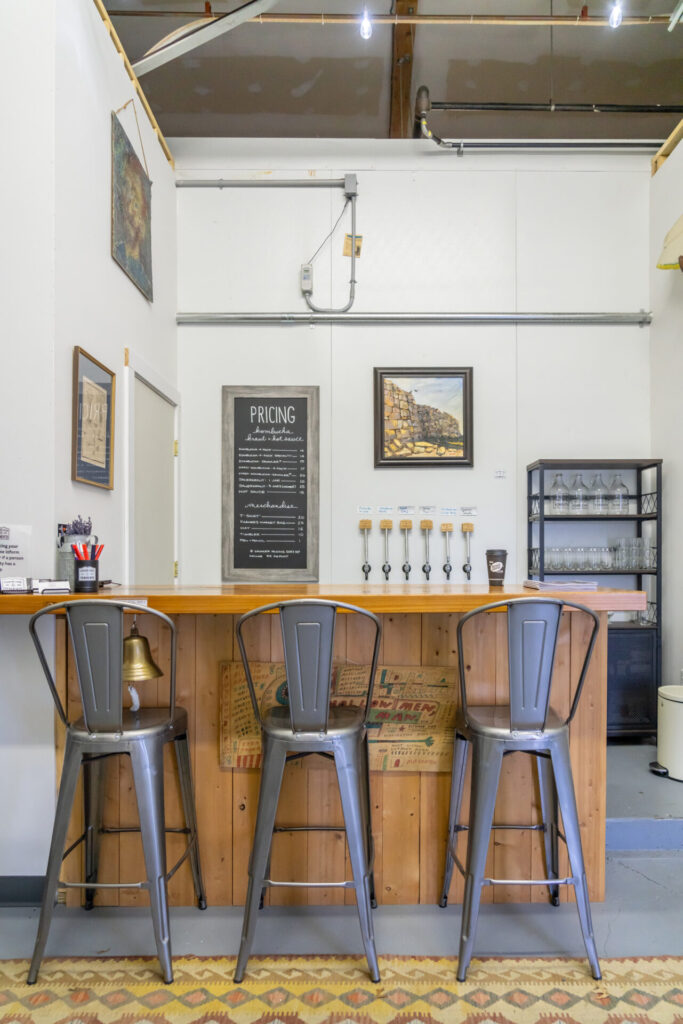“My parents have been growing sprouts and making sauerkraut since I was a child,” says Dylan L’Abbe-Lindquist, owner of Gloucester’s Pigeon Cove Ferments, a small business dedicated to the art of fermented food and drink. “When we started doing sauerkraut, that was sort of our way to be part of the local food systems.” That was in 2015. Dylan and his wife, Kristen L’Abbe-Lindquist, had just had a baby, and the couple was exploring how to segue into a new business.
“The house that we live in is actually the house I grew up in,” Dylan L’Abbe-Lindquist says. The couple started with sauerkraut, made from produce grown in their own garden, for the first test batches. After a few years, they expanded their product line to include other fermented products, made from ingredients sourced from local farms and gardens. With a background in beer-brewing, Dylan knew that he could bring to the table another element of fermentation. “Other people out there were making sauerkraut and kombucha, and it just sort of fit the mold as something to expand into,” he says. “It was very easy to go from making a gallon or two at home to larger batches.”

Today, Pigeon Cove Ferments, named for Rockport’s Pigeon Cove, where Dylan and Kristen live, though the business itself is housed in Gloucester, produces far more than just sauerkraut. In fact, the brand, now wrapping up its first decade, can be found in Market Basket and Crosby Marketplace stores throughout New England, where fermentation-enthusiasts can seek out krauts, kimchis—the versions they make lack fish sauce or dried shrimp and are, therefore, vegan—and a line of kombuchas. Limited-batch, seasonal flavors are also available at the store.
The six main SKUs of Pigeon Cove Ferments’ kombucha—pineapple chamomile, hibiscus ginger, jasmine lavender, blueberry cinnamon, raspberry basil, and cucumber jalapeño—are all now certified organic. “We’ve been working on that for over a year now,” Dylan says. “It’s recognized by the state.”
Kombucha lovers can visit the store for refillable 64-ounce growlers. The growlers, which have a one-time bottle deposit, can be filled at the taproom, where additional kombucha flavors are often on offer. “We will just put different, fun flavors on and you can come in, fill up a growler, take a growler home with you, and then, after 10 fills, the 11th growler is free,” Kristen L’Abbe-Lindquist says.

“We have six draught lines here,” Dylan adds. “We’ll do, like, a passionfruit, or fun flavors that we have on draught that you can only get here.” Although the kombucha cans are available through major retailers, the specialty flavors are sold only within the taproom, an excellent reason to stop in, especially on Thursdays, when Pigeon Cove keeps extended hours until 7 p.m., accommodating those who might want to stop by after work.
Within the Gloucester space, of-age visitors can also pick up the hard kombuchas, available in cans. At times, the hard kombucha is sold on one of the draught lines, and it is also sold in refrigerator cases within the Pigeon Cove Ferments’ Gloucester space. The L’Abbe-Lindquist team has also operated collaborations with other businesses, like Dunks Mushrooms, a purveyor based in Brentwood, New Hampshire. “He makes a coffee and dried lion’s mane blend, and we take his blend and then make a kombucha out of it,” Dylan says.

In addition to that limited small-batch kombucha, Pigeon Cove also works with other local farms in the production of their goods, like Gloucester’s Cedar Rock Gardens, Ipswich’s Appleton Farms, South Hamilton’s Iron Ox Farm, and Rockport’s Seaview Farm.
The L’Abbe-Lindquists are also looking to broaden the scope of their business. The Gloucester space, they say, is big enough to accommodate more, and fermentation is an ever-widening field. “Thankfully, we’re fortunate to have a lot of room in this building to expand,” Dylan says. “We started out in one unit. We’ve taken over two other units in the building, and there’s still more space to grow if we need it.”
One ambition, moving forward, Kristen says, is to offer the public more access to their products. “We would love to have a tasting room that’s more accessible to the public someday,” she says. “We would want to find a spot either back in Rockport or in downtown Gloucester.”

